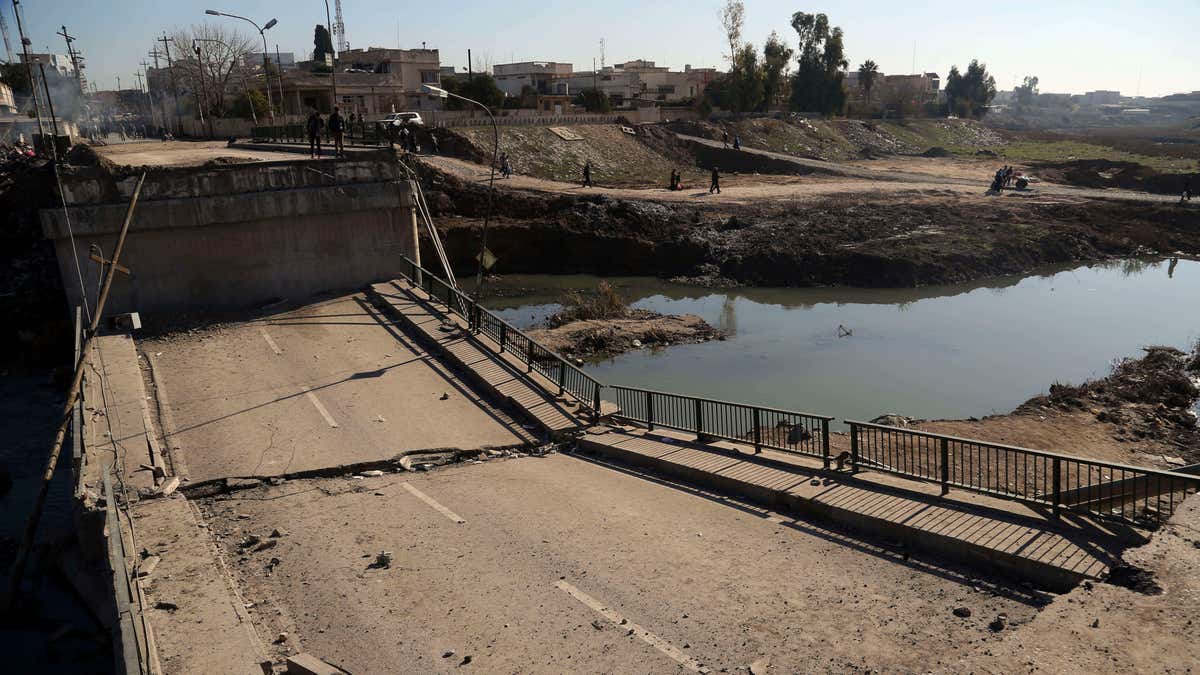
Jan. 12, 2017: People inspect a bridge destroyed by Islamic State militants in a neighborhood recently liberated from Islamic State on the eastern side of Mosul, Iraq. (AP)
IRBIL, Iraq – Iraqi special forces entered Mosul University on Friday in their latest advance along the eastern front as they battle Islamic State militants for control of the city, according to senior Iraqi officers.
ISIS FANATIC BEHIND PARIS MASSACRE SAYS HE GETS LOVE LETTERS IN PRISON
The troops entered the university grounds in the morning hours and by afternoon, they had taken control of a neighborhood on the northeastern edge of the university compound and the technical institute within the campus, according to special forces Brig. Gen. Haider Fadhil and Maj. Gen. Sami al-Aridi.
"We broke through the terrorists' defenses and we destroyed their lines and their units and their bases," said al-Aridi, who was overseeing the assault Friday.
The university is located in the eastern section of Mosul, Iraq's second-largest city which is divided by the Tigris River into roughly an eastern and a western half.
FIRST WAVE OF HUNGARY'S 'BORDER HUNTERS' PREPARES TO PUSH BACK REFUGEES
Sgt. Saad Jabar said that over the past two years since IS seized Mosul in a 2014 blitz that captured much of northern and western Iraq, the militants have had time to prepare for an assault by Iraqi forces, building tunnels and getaways across the city, including "They had reinforced their positions and had plans. They knew where to come in and where to get out," Jabar said.
The push into Mosul University came a day after Iraqi army forces north of the city linked up with troops pushing in from the city's eastern edge. Iraqi forces have largely surrounded Mosul, but the most significant advances on the city have come from the eastern front and in the eastern half of the city. IS still controls Mosul's west.
The university, founded in the 1960s, was one of the top educational institutions in Iraq, drawing students from all over the country and reflecting the city's once diverse ethnic makeup. As the security situation in Mosul deteriorated following the 2003 U.S.-led invasion of Iraq, enrollments declined.
After the city fell to IS in the summer 2014, the sprawling complex was shuttered, most of the professors fled and the university was quickly converted into a base by the militants who used its medical and engineering departments.
Residents fleeing Mosul say the university had been largely destroyed by airstrikes and artillery fire. The U.S.-led coalition said that since Dec. 29, coalition planes have dropped at least 43 munitions on the university in a series of strikes targeting laboratories IS used to research chemical weapons, buildings used to build car bombs and other IS command and control points.
The U.S.-led coalition supporting the Iraqi forces offensive on Mosul told The Associated Press on Friday that the Islamic State group "warped the purpose of a beloved institution of higher learning when they used the university for military purposes."
"The entire university has been burned," said Muhammad Dhia, a 26-year-old former university student who was fleeing Mosul on Thursday to try and complete his studies in Baghdad.
"I think it will take at least two or three years to rebuild," he added.
Iraqi special forces Lt. Gen. Abdul-Wahab al-Saadi told the AP it was unclear if the complex was still being used as an IS base. Under heavy bombardment from US-led coalition airstrikes, IS has repeatedly moved bases out of government buildings and under cover of civilians. Earlier this month, Iraqi forces retook a hospital that had been converted into an IS base.
Regardless, al-Saadi said retaking the university would be a major symbolic victory in the fight for Mosul.
As the Mosul operation enters its fourth month, Iraqi forces have retaken about a third of the city that has been under tight IS control for more than two years. While Iraqi officials initially pledged the city would be "liberated" this year, the fight is likely last many more months.
